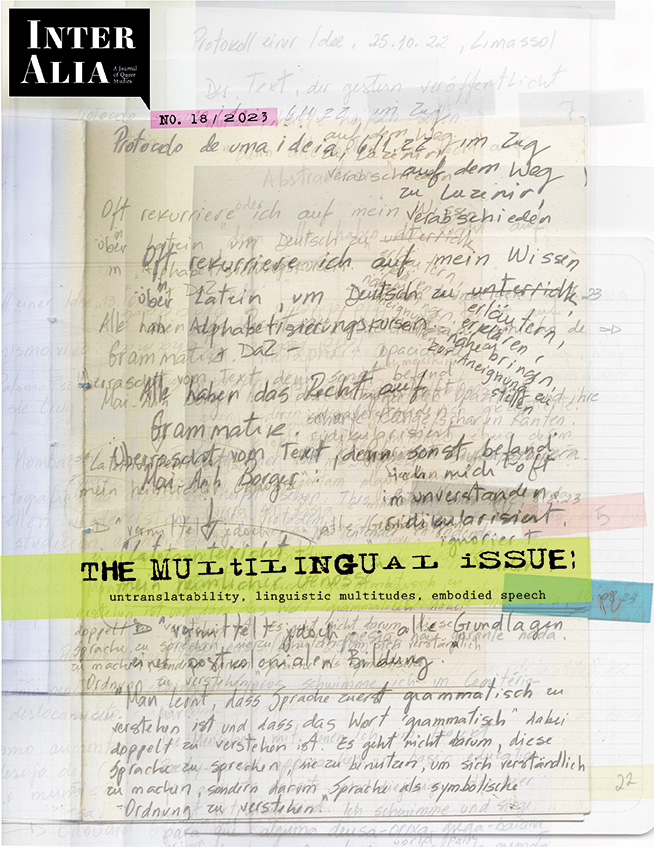untranslatability, linguistic multitudes, embodied speech
InterAlia 18-2023 out now!
On the website of InterAlia. Journal of Queer Studies you may now download The Multilingual Issue. Furthermore, varios artistic video works, sign language videos as well as creative writing can be enjoyed directly on the website.
The Multilingual Issue engages with articulating queerness across different languages, considering untranslatabilities as well as hierarchies that have developed between languages. Such hierarchies include the devaluation of embodied speech as it, for example, happens to sign languages of Deaf cultures. The issue‘s aim is to highlight and disrupt such hierarchies, while respecting untranslatabilties and linguistic multitudes that derive from migration, disability, and disenfranchisement. A complex net is drawn by the authors and artists between very different geo-political loctions. Some of the questions tackled are: Which languages, dialects, registers, or codes are used to communicate issues related to pleasures, desires, and belonging? What does it mean when one’s first language is shadowed by another acquired later on? What is the impact on the person and their communities? How does language affect your sense of identity and belonging and what is the role of visibilities and opacities in that?
The issue includes contributions of various genres, formats, and aesthetics: artistic video works, diary/journal entries, conversations-turned-into-a-five-act-play, academic articles, and the introduction to the German translation of Gloria Anzaldúa’s classic Borderlands/La frontera. Part of the issue is written in Damía. For two contributions, among it an article on Deaf queer culture, it offers sign language interpretations.
Edited by Antke A. Engel and Anna T.
With contributions by Mariana Aboim, Ju Bavyka and Masha Beketova, Chaka-Kollektiv (Claudia Frikh-Khar, Nina Höchtl, Verena Melgarejo Weinandt), Anna Daučíková, Denis Ferhatović. Pêdra Costa, Preity Kumar, ONCE WE WERE ISLANDS, Daniela Rodriguez A., Rubia Salgado, Martin*a Vahemäe-Zierold and Maria Kopf as well as International Sign videos by Dana Cermane and Mandy Wyrostek.

Cover Design: Adriana Torres Topaga
Concept and work program
for an issue of InterAlia. Journal of Queer Studies edited by Anna T. and Antke Engel, to be published end of 2023.
Please find here the Call for Papers, Art, and Reviewers (CFPAAR), October 2022, for download: Call for Contributions
Here is an excerpt: “English has become the de facto lingua franca in the academic world and it often dominates both scholarly and activist discourse around LGBTQIA+ issues (at least as they are discussed in the Western/Northern hemispheres). We want to use English while simultaneously activating other languages and registers to expand the discussion on issues of (a)sexualities and (a)genders in their constant interplay with dimensions of class, caste, race, dis_ability, neurodiversity, technology, and others we are not aware of or don’t yet have words available to think about. The different historical and geopolitical ways in which power and knowledge intertwine, as well as processes of un_learning from and with one another are meant to be a thread woven through the issue and its production. So we call on people who write in one language, in two, in several, or who code-switch, those who speak/write in mixed formats (e.g. Spanglish, Englabic, Greeklish) to share their work with us reflecting on language, desire, and relating. If we receive a text in languages we (the co-editors and the editorial board) are not familiar with we will try finding someone who does to help us with the peer-review process.”
Thus, we are not only looking for authors and artists who would like to engage with the topic, but also for people who would be interested in inventing and supporting a new review process – having in mind the issue as a whole, and the challenges of multilingual exchange.
Abstracts and proposals (500 words max) had been submitted by Nov. 30, 2022 via the InterAlia submission page: https://interalia.queerstudies.pl/article-proposal/
Anna T. (she/αυτή/sie) and Antke Antek (ens/they)
Queer Multilinguality and Embodied Speech
The production of the issue will be supported by a series of workshops:
Wed 21 Dec, 2022 Verkörperte Sprache / Embodied Speech
Wed 22 Feb, 2023 (internal)
Mo 8 May, 2023 Multilingually queer
Thu 15 June, 2023 The membra(I)ne as a translation device
Thu 29 June, 2023 Poetic Transitions
02 Sept & 22 Oct, 2023 Collective Editing
The public workshop program is funded by Hannchen-Mehrzwecks-Stiftung.

Aktion Mensch has funded the production of sign language videos (IS and DGS).

